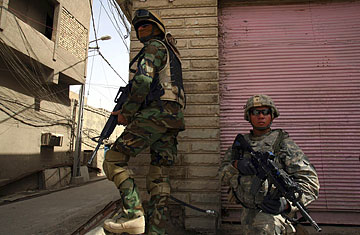
An Iraqi soldier, left, and a U.S. soldier in Sadr City on April 9
Iraqi Prime Minister Nouri al-Maliki hardened his stance against Shi'ite militia leader Moqtada al-Sadr Sunday, airing draft legislation that could potentially bar Sadrists from participating in fall elections.
The measure, approved by Maliki's cabinet, would prevent political parties with militias from running in provincial races slated for October. That means politicians loyal to Sadr, who include at present a sizable bloc in parliament, would be ineligible because of their connection to Sadr's Mahdi Army militia. Some observers, however, were skeptical the measure would go anywhere, since one of the other key Shi'ite parties, the Islamic Supreme Council of Iraq, has its own militia, the Badr Brigade.
Still, the announcement is certain to heighten tensions between Maliki and Sadr, whose forces have been fighting Iraqi and U.S. troops on the streets of east Baghdad for the past week. And ironically, it was announced after a relative lull in violence in Sadr City. In fact, Saturday night passed in Sadr City with no dead or wounded appearing in the hospitals of the battered Shi'ite warren, where clashes have left more than 100 dead. Overnight the gunfire that had rattled across the slum through the past several days slowed, and by late afternoon Sunday an edgy calm was emerging.
But the pause in Sadr City is unlikely to spur many hopes among Sadr City residents for an end to the fighting. Baghdadis of all the city's neighborhoods know by now that periods of peace are often followed by waves of bloodletting. And the dispute between al-Sadr and the Iraqi and American troops pressing into his stronghold seems only to be deepening, making the possibility of renewed fighting all but inevitable unless one or both sides begins searching anew for some sort of political compromise.
American and Iraqi officials had been casting around for some sort of political solution to end the violence since Sadr's forces fended off an assault by Iraqi government troops last month. Those clashes were sparked after a failed campaign by Iraqi security forces against the Mahdi Army in Basra. During the fighting in Basra an estimated 1,000 men from Iraqi security forces either refused to fight or outright switched sides and joined the Mahdi Army, leading the Iraqi government on Sunday to announce the dismissal of some 1,300 soldiers and policemen.
On Friday, U.S. Defense Secretary Robert Gates brushed aside suggestions that U.S. or Iraqi forces would move to arrest Sadr himself. Sadr, Gates said, should rejoin the political process rather than waste away in jail. "He is a significant political figure," Gates said of Sadr. "We want him to work within the political process. He has a large following. It is important that he become a part of the process, if he is not already."
The statement amounted to an overture toward Sadr, whose unilateral cease-fire last year was a major factor in lowering levels of violence across Iraq. The Americans appear eager to restore the truce, which has essentially broken down as U.S. troops back Iraqi forces fighting militiamen in Sadr City. But Sadr, whose bloc of political loyalists long ago boycotted the Iraqi government, sounded a note of defiance that seemed to slam the door on hopes of peaceful resolution.
"You [infidels] will always be an enemy and you will remain so until the last drop of my blood," Sadr said in a statement responding to the comments by Gates. "If you don't withdraw from our land or set a timetable for withdrawal acceptable to the Iraqi people, we will resist in the way we see fit."
Sadr has rejected calls by the Iraqi government for his group to disband thus far, and Iraqi officials say they plan to press their campaign in Sadr City and Basra until all militia groups are defanged. It remains unclear, however, how many gains Iraqi and U.S. forces can make against Sadr's fighters, who have proved formidable.
Sadr, who was thought to be undertaking intensive religious studies in Iran over the past several months, is rumored to be back in the southern Iraqi city of Najaf, where he keeps a political council. Salah al-Ubaide, a member of Sadr's Najaf council, said Sadr and his followers were still open to a political compromise that might end the current standoff—but held out little hope.
